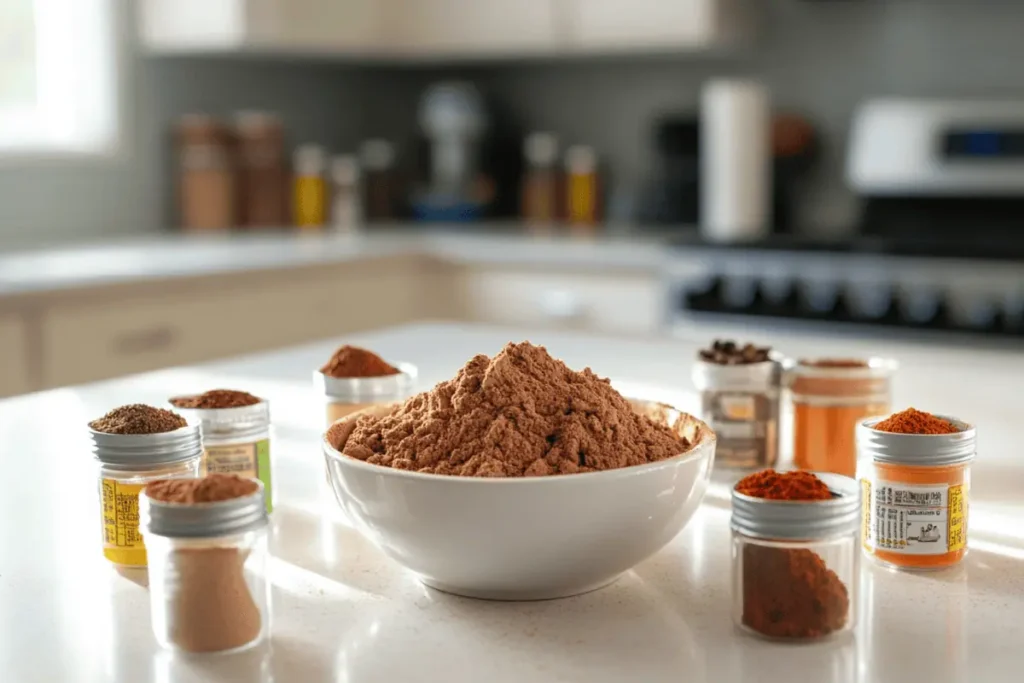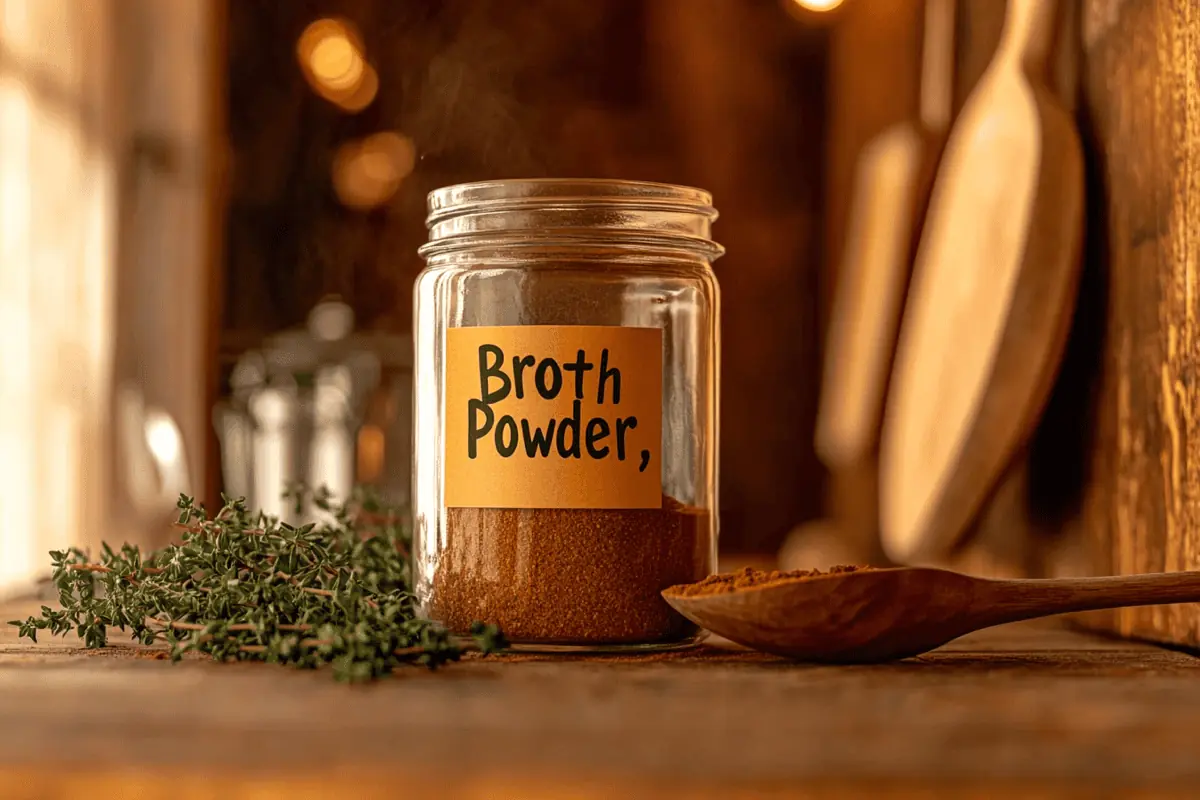Broth powder offers a convenient way to add rich flavor to your meals. It dissolves quickly in hot liquids and provides a savory base for soups, stews, and sauces. Moreover, this simple option helps you avoid the time-consuming task of making broth from scratch. In fact, many people keep a jar or packet of chicken bone broth powder in their kitchen for busy days. Yet, broth powder is not limited to chicken-based dishes. You can also find beef bone powder, organic chicken broth powder, and even dry chicken stock. These varieties meet different needs while still delivering hearty taste.
Yet, this easy-to-use product has more value than convenience. Because it is usually dehydrated, you can store it in your pantry without worrying about spoilage. It travels well too, so you can take it on camping trips or vacations. You simply mix it with hot water to create a savory drink. Or, you can sprinkle it on vegetables or grains for extra flavor. Meanwhile, certain brands strive for high-quality ingredients, such as free-range chicken bones or responsibly sourced beef. This focus can lead to deeper taste and a cleaner ingredient list.
This article dives into the details of broth powder. It will show you how to pick the right type, whether you want organic chicken broth powder, dry chicken broth powder, or beef bone powder. You will also learn ways to use it in daily cooking and advanced recipes. Additionally, you will see how to store it so it lasts longer. By the end, you will understand why more people are turning to this ingredient for ease, taste, and nutrition.
Table of contents
Understanding Broth Powder and Its Varieties
Broth powder is often made by simmering bones, vegetables, and spices to extract flavors and nutrients. The liquid is then dehydrated into a powdered form. This process locks in the essence of the broth. As a result, you can rehydrate it quickly by stirring it into hot water. In many cases, manufacturers will further refine the product by adding salt, herbs, or other seasonings. That way, the powder tastes flavorful right out of the package.
Because of its concentrated nature, broth powder lets you adjust how strong you want your broth or sauce. If you prefer a subtle flavor, use a smaller amount. If you crave something bolder, add an extra spoonful. This customization feature appeals to home cooks who enjoy control over the taste of their meals. Still, be mindful of sodium content. Some brands add salt to make the flavor pop. Therefore, reading labels helps you avoid excessive salt in your diet.
Choosing Between Chicken Bone Broth Powder and Other Options
Chicken bone broth powder stands out for its light yet savory flavor. Many people like to use it when cooking poultry-based dishes, such as chicken soup or casserole. Moreover, if it is labeled as organic chicken broth powder, it often comes from ethically raised chickens. The stock might contain fewer artificial ingredients or chemicals. On the other hand, a standard dry chicken broth powder may include additives to intensify flavor and increase shelf life. Reading ingredient lists can guide your choice, especially if you value purity.
Additionally, you can find products labeled dry chicken stock or dry chicken broth. The term “stock” might imply a longer simmering process with bones, whereas “broth” might be lighter in body because it may use more meat than bones. However, these terms can vary by brand. In any case, both stock and broth powders bring a chicken-forward taste to your recipes. They work well as a quick base for gravies, soups, or rice dishes.
Meanwhile, beef bone powder caters to those who enjoy richer, more robust flavors. Because beef bones contain more collagen, the powder can bring a fuller mouthfeel to recipes. It excels in dishes that call for a hearty, beefy kick, such as beef stew or chili. You can also combine it with chicken bone broth powder for a unique fusion if you feel adventurous. The blend can create a multi-layered profile, especially if you are making a stew that already has multiple proteins or vegetables.
Why Broth Powder Is So Popular
Many people lead busy lives and lack the time to simmer bones and vegetables for hours. Broth powder addresses this issue. You can quickly dissolve a spoonful in water to create an instant soup base. Because of its shelf stability, you do not need a freezer or refrigerator to store it. That is a big advantage if you have limited kitchen space or like to travel. Furthermore, it can fit well in an office setting, where you just need hot water and a mug. By sipping on a warm cup of broth, you can stay cozy without relying on heavily processed vending machine snacks.
In addition, broth powder allows you to avoid food waste. When you buy liquid broths, you might open a carton and only use part of it. The rest can go bad if you do not store it properly. Dry chicken broth powder or beef bone powder, on the other hand, remains fresh until you decide to use it. You can measure out only what you need. The remaining product stays sealed for future recipes. This aspect can save you money over time, because you reduce spoilage.

Nutritional Considerations
Bone-based powders, such as chicken bone broth powder or beef bone powder, may offer certain nutrients. The slow simmering process can draw out minerals from the bones. Plus, it may release gelatin, which can be dried into collagen peptides. Some people believe that collagen supports joint and gut health. Though research varies, many individuals enjoy bone broth for these potential benefits. Moreover, if you choose organic chicken broth powder, you minimize exposure to hormones or antibiotics that may come from conventional farming.
Still, moderation is key. Some powders have high sodium, which can be a concern if you are watching your salt intake. To address this, look for low-sodium or no-salt-added versions. Additionally, you might want to incorporate fresh herbs, garlic, or onions for flavor instead of relying solely on salt. Lastly, while the powder can provide certain vitamins or minerals, it is not a complete replacement for a balanced diet. It should be one component of an overall healthy meal plan.
How to Use Broth Powder in Everyday Cooking
You can use broth powder in countless ways. One of the simplest methods is to create a base for soups. Start by dissolving the recommended amount in hot water, then add vegetables, proteins, and grains. Simmer until everything is cooked. If you want a creamier soup, stir in some milk or a dairy-free alternative. This approach works especially well with chicken bone broth powder or dry chicken stock if you are making a poultry-inspired soup.
Another idea is to replace liquid broth in recipes with an equivalent amount of water plus the powder. For instance, if a recipe calls for two cups of chicken broth, you can use two cups of water and the correct measure of dry chicken broth powder. That trick helps you avoid buying heavy cartons of broth. You also bypass the guesswork of how to store leftovers.
Boosting Flavor in Grains and Sides
Broth powder can transform the taste of rice, quinoa, or couscous. Instead of cooking these grains in plain water, dissolve your preferred powder in the water before adding the grains. That gives them a savory edge. You can do the same for mashed potatoes or polenta. If you want a richer result, use beef bone powder for robust flavor or dry chicken broth for a lighter undertone. The choice depends on the protein or vegetable you plan to serve alongside the grains.
You can also add a sprinkle of organic chicken broth powder to stir-fries. Mix it in after adding your sauce, so it dissolves without clumping. The powder will enhance the dish without requiring you to open an entire container of liquid broth. Because you can control how much you add, you can test small amounts and adjust as needed. If you use more than one type of broth powder, label them clearly in your pantry to avoid confusion. Each variety has its own taste profile.
Comparing Chicken Bone Broth Powder and Dry Chicken Broth Powder
Chicken bone broth powder and dry chicken broth powder might sound alike, but they can differ in composition. Chicken bone broth powder usually involves a slow simmer with chicken bones. It tends to have more collagen and may provide a thicker mouthfeel when rehydrated. Meanwhile, a dry chicken broth powder might focus more on meat flavor rather than collagen from bones. The difference can affect your final dish.
If you want a delicate soup that focuses on chicken’s natural taste, choose dry chicken broth powder. However, if you crave that gelatinous texture often associated with bone broth, chicken bone broth powder might be the superior pick. Some individuals also believe that collagen in bone broth has health perks. They include joint support and improved skin elasticity. Whether these claims hold true for everyone varies, but many people still favor bone-based products for potential health gains.
Organic Chicken Broth Powder for Better Quality
Sometimes, you will see organic chicken broth powder on store shelves. Organic methods can restrict the use of certain pesticides, antibiotics, or genetically modified feed. This approach helps assure that your final product is free from many common synthetic chemicals. If you prioritize clean eating, you might appreciate this certification. However, check the label for sodium content or any additional flavor enhancers. A product can still be organic while containing salt or other seasonings. Make sure it aligns with your dietary aims.
For those seeking more transparency, read brand websites or user reviews. Many companies outline their sourcing process. They may note if the chickens were pasture-raised or if they used only organic vegetables in the broth. This information helps you decide which product best meets your tastes and values. Some brands also add herbs like thyme or rosemary to their powder. That inclusion can simplify your cooking further, as it offers a built-in bouquet of flavors.

Making the Most of Beef Bone Powder in Hearty Recipes
Beef bone powder excels in heartier meals. It offers a full-bodied taste that pairs well with beef stew, chili, or pot roast. You can also use it in sauces for pasta dishes that feature ground beef or sausage. Simply dissolve the powder in warm water, then add it to your tomato sauce or gravy. The result might remind you of a slow-cooked sauce, but you finish in a fraction of the time.
You can also craft a robust drink by mixing the powder with hot water. This method can be soothing during cold weather. Some people enjoy sipping beef bone broth in the morning instead of coffee. They find it comforting and potentially beneficial for their joints. If you do not like the taste plain, add herbs or a pinch of spices. A dash of black pepper or cayenne can boost the flavor while providing a bit of heat.
Improving Gravies and Sauces
When making gravy, whisk a bit of beef bone powder into a roux or cornstarch slurry. Add water or pan drippings, then simmer until thickened. This approach intensifies the beefy notes in your sauce, making it ideal for mashed potatoes or roast beef. Similarly, you can incorporate the powder into a mushroom sauce. Sauté mushrooms in butter or oil, add seasonings, then stir in the powder. Blend with water or cream to reach your desired thickness. This sauce pairs well with steaks or even vegetarian dishes. The robust flavor can make mushrooms taste extremely satisfying.
Storing and Handling Dry Chicken Stock and Dry Chicken Broth
Dry chicken stock and dry chicken broth should be kept in airtight containers. Store them in a cool, dry area of your kitchen, away from direct sunlight. These products usually have a long shelf life, but they can clump if exposed to moisture. Also, check the expiration date on the label. Because they are dried, they can stay fresh for many months, but the flavor may fade over time.
When measuring, use a clean, dry spoon. If you add the spoon directly to a steaming pot, you risk introducing moisture. This simple tip helps preserve the powder’s quality. If you spot lumps or a strange odor, it might be time to discard it. Although mold is less common in dry products, they can still degrade if stored improperly. As a rule of thumb, always close the container tightly after each use.

Conclusion
Broth powder delivers big flavor in a small package. It offers a quick alternative to homemade broth, saving you time and effort. Whether you pick chicken bone broth powder, beef bone powder, or a classic dry chicken broth, you can easily tailor the depth of flavor in your meals. This flexibility helps you adapt to varied recipes, from light soups to rich sauces. Meanwhile, the convenience of storing a shelf-stable powder can reduce food waste. You only scoop out what you need, with no concern about leftover liquid spoiling in the fridge.
Also, you might choose organic chicken broth powder if you prioritize cleaner ingredients. Or, you could pick a simpler dry chicken stock for an all-around savory base. Regardless of the variety, these powders let you craft comforting meals without the long simmer times. They work for a quick cup of warm broth or a robust stew. So, if your pantry has yet to include broth powder, consider adding it. You will likely enjoy the versatility and convenience, as well as the tasty results it can produce.
Frequently Asked Questions
What is broth powder?
It is a dehydrated form of soup stock or bone broth. You can reconstitute it with hot water to create a liquid broth or add it directly to recipes for flavor.
Is broth powder the same as bouillon?
They are similar, but broth powder often focuses on the essence of bones and meat. Bouillon can have more salt and sometimes additional seasonings.
Is broth powder healthy?
It can be part of a balanced diet, especially if you watch the sodium content. Bone-based powders may offer collagen and other nutrients.
What is the difference between broth and stock broth?
Stock usually comes from simmering bones, often with minimal seasoning. Broth can be lighter, using more meat and vegetables. Both forms can be made into powder.




